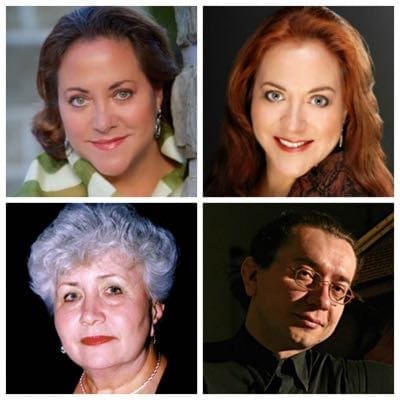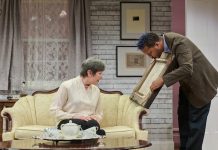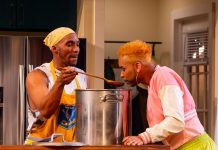If there is one thing that those of us in the DC metropolitan area can be sure of when it comes to classical music, it is that finding great examples of it on virtually any night of the week will not present a challenge. Those of us with a special love for art songs may have more of one, but those with a predilection for rarities of the Russian kind may, paradoxically, have less of one, thanks to the Russian Chamber Art Society (RCAS), which offered an exceptional concert at its new French embassy home Friday night.

That said, getting into the concert was a challenge. At the security entrance, three attendee lists with varying levels of commonality seemed to be conspiring to keep several of us out, each staffer suggesting we ask the other two to see if our name was on that list, resulting in a tripartite Alphonse-and-Gaston that was culturally and linguistically (and, in hindsight, hilariously) apropos, given the venue.
The performance that followed, in the embassy’s comfortably appointed La Maison Française (the back of the stage filled, for this concert, by a full-color photograph of the Moscow Conservatory’s Great Hall, projected onto a huge screen) carried on the paradigm, if unwittingly, and added yet another level to it. Rather than humorous, however, this one was both serious and significant. The program of art-song duets and pieces for piano four-hands by 19th-century Russian composers transcribed from larger works was performed by the four musicians with a facility and a warm comradery that not only had this listener occasionally trying to decide (as a reviewer) which artist was making which sound, but also made her wish (as a music lover) she wouldn’t have to.
Soprano Lori Phillips and mezzo-soprano Mary Phillips, twin sisters who have been critically acclaimed in opera houses and on concert stages both here and abroad, had performed together just once before until this concert, giving this recital an unusual distinction. From the first two songs, Mikhail Glinka’s “How Sweet It Is to Be With You” and “You Won’t Come Again,” their ease of production and harmonic convergence (the musical, not the Mayan, although with similarly satisfying alignment) were evident. Both singers displayed a dramatic soprano’s range and a burnished tonal brilliance, while amiably anticipating each other’s cues and facilitating their entrances.
In Glinka’s “Waltz Fantasy,” the two pianists, Genadi Zagor and RCAS Founder and Artistic Director Vera Danchenko-Stern, seemed equally at ease, Danchenko-Stern’s melody line delightfully mellifluous, her descending scales scrolling fluently downward and the imagined narrative moving steadily forward. In the “Waltz” section of Anton Arensky’s “Six Children’s Pieces” (op. 34) the two pianists played companionably and conversationally, in a musical convergence of their own. Watching their hands complement even when crossing over each other’s, observing as each listened keenly or contentedly to the other’s tinkling arpeggios or resounding chords, one could easily imagine a young couple on the dance floor being swept up in the music, their eyes and hands connecting in a prelude to romance, or the next dance.
The last of the six (the other four: “Fairy Tale,” “Coo-coo,” “Tears” and “Cradle Song”) is “The Crane,” which contains a fugue on a well-known Russian theme, and which Zagor and Danchenko-Stern played with a pleasingly joking lightness.
Closing the first half of the program, Arensky’s “Violet” (op. 29, no. 3) offered the rare pleasure of hearing both singers sustain the same high note in unison, the sound gloriously ringing and rounded, followed by Aleksandr Gretchaninov’s “Day Dreams,” in which first Lori, then Mary hit a climactic top note with stunning clarity and thrilling richness.
Introducing Nikolai Rimsky-Korsakov’s “Angel and Demon” (op. 52, no. 4) Lori Phillips asked us to contemplate the age-old conundrum of whether art imitates life, or life imitates art, adding archly: “Well, here you have it: In this song, I’m the angel and Mary’s the demon. Make of it what you will.”The two sopranos/spirits pulled it off with masterful persuasiveness, each of them equally determined to convince the listener of her own (character’s) superiority.
The next several selections were performed by the two pianists. In (and under) Zagor’s and Danchenko-Stern’s skillful and intuitively responsive hands, Rachmaninov’s dark and despairing “Russian Theme” (op. 11, no. 3) ebbed, then flowed; rushed in, and then receded, like a series of waves: commencing with a muscular strength, fading, then building to a powerful declamation, only to diminish, then grow again, concluding in a statement of survivor’s power, rather than victor’s aggression.
Danchenko-Stern exhibited a jaw-dropping fleetness and agility in Rachmaninov’s “Scherzo” (op. 11, no. 2). The Four Pieces from the Nutcracker (arranged for piano by E. Hayward) that came next, while well played by the two pianists, were generally too well-known to hold more than passing interest. The last of the excerpts, the “Waltz of the Flowers,” was even mildly disappointing, sounding somewhat choppy at the start, which is not surprising: Though arranged over the years for any number of solo instruments and combinations of instruments, in the original, the intonation and sonority of the strings predominate, and are key to the piece’s power. While unable to overcome the inherent disadvantage of a piano arrangement, Danchenko-Stern and Zagor grew steadily unified and interpretively compatible, ending the selection with a smash in a satisfying fortissimo.
Somewhat incongruously (given the premise) but surprisingly rewardingly, the most compelling and affecting section of the Nutcracker was the orchestrally delicate but pianistically dynamic “Dance of the Flutes.” Here, this listener found herself inching upward and forward, out of her seat and back again with the music in infinitesimal increments, so electrifying were the explosions and accelerations of Danchenko-Stern’s and Zagor’s crescendoes and decrescendoes.
To conclude the program, Lori and Mary Phillips (with Danchenko-Stern at the piano) offered three duets by Tchaikovsky.First came the soothing and poetic “Lisa and Polina Duet” (lyrics by Pushkin) from his opera Queen of Spades, which the three musicians gave a harmonious rendering. The song “Tears” (op. 46, no. 3) was among the composer’s “favorite offspring,” as he wrote his friend and patron Nadezhda von Meck, adding: “I am quite certain, alas, that it will never be performed as I imagined. It must not be sung, but declaimed quickly and with great passion.” The Phillips sisters may not have gotten the letter, but they certainly got the memo, their voices’ timbre like that of two impeccably tuned instruments being seamlessly bowed, played or blown; the mood, one of impassioned sorrow.
The fusion reached apotheosis with the final song, “Passion Has Fled,” the dramatic intensity heightening as each singer picked up the narrative from the other—“Everything that is not boring is false”—“Everything that is not you is colorless and dead”—the two voices increasingly indistinguishable; in the end, a vocally turbo-charged twin engine emitting a single, searing sound.
They were, of course, two: just as there were two superbly complementary and coordinating pianists who, while not blood relatives, seemed to similarly sense and experience each other not just musically, but kinetically and artistically.
It doesn’t get much better than that.
Running Time: One hour and 40 minutes, including an intermission.
Masterpieces of Russian Vocal Music: Enchanted Evening of Vocal & Piano Duets was performed on December 8, 2016, at La Maison Française at The Embassy of France – 4101 Reservoir Road, in Washington, DC.
RATING:




